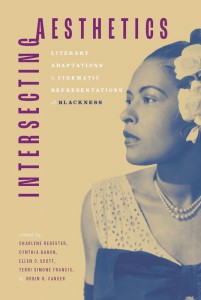Intersecting Aesthetics
Literary Adaptations and Cinematic Representations of Blackness
Edited by Charlene Regester, Cynthia Baron and Ellen C. Scott


Average rating: ![]()
| 0 | rating | |
| 0 | rating | |
| 0 | rating | |
| 0 | rating |
Your rating: -
Book Presentation:
Contributions by Cynthia Baron, Elizabeth Binggeli, Kimberly Nichele Brown, Priscilla Layne, Eric Pierson, Charlene Regester, Ellen C. Scott, Tanya L. Shields, and Judith E. Smith
Intersecting Aesthetics: Literary Adaptations and Cinematic Representations of Blackness illuminates cultural and material trends that shaped Black film adaptations during the twentieth century. Contributors to this collection reveal how Black literary and filmic texts are sites of negotiation between dominant and resistant perspectives. Their work ultimately explores the effects racial perspectives have on film adaptations and how race-inflected cultural norms have influenced studio and independent film depictions. Several chapters analyze how self-censorship and industry censorship affect Black writing and the adaptations of Black stories in early to mid-twentieth-century America. Using archival material, contributors demonstrate the ways commercial obstacles have led Black writers and white-dominated studios to mask Black experiences. Other chapters document instances in which Black writers and directors navigate cultural norms and material realities to realize their visions in literary works, independent films, and studio productions. Through uncovering patterns in Black film adaptations, Intersecting Aesthetics reveals themes, aesthetic strategies, and cultural dynamics that rightfully belong to accounts of film adaptation.
The volume considers travelogue and autobiography sources along with the fiction of Black authors H. G. de Lisser, Richard Wright, Ann Petry, Frank Yerby, and Walter Mosley. Contributors examine independent films The Love Wanga (1936) and The Devil's Daughter (1939); Melvin Van Peebles's first feature, The Story of a Three Day Pass (1967); and the Senegalese film Karmen Ge (2001). They also explore studio-era films In This Our Life (1942), The Foxes of Harrow (1947), Lydia Bailey (1952), The Golden Hawk (1952), and The Saracen Blade (1954) and post-studio films The Learning Tree (1969), Shaft (1971), Lady Sings the Blues (1972), and Devil in a Blue Dress (1995).
About the authors:
Charlene Regester is associate professor in the Department of African, African American, and Diaspora Studies and affiliate faculty with the Global Cinema Minor at the University of North Carolina at Chapel Hill. Cynthia Baron is professor in the Department of Theatre and Film at Bowling Green State University. Ellen C. Scott is associate professor in the School of Theater, Film, and Television at the University of California, Los Angeles. Terri Simone Francis is associate professor of cinematic arts at the University of Miami. Robin G. Vander is associate professor in the Department of English at Xavier University of Louisiana.
See the publisher website: University Press of Mississippi
> From the same authors:
Cinema Civil Rights (2015)
Regulation, Repression, and Race in the Classical Hollywood Era
Subject: Sociology
Appetites and Anxieties (2013)
Food, Film, and the Politics of Representation
by Cynthia Baron, Diane Carson and Mark Bernard
Subject: Sociology
More than a Method (2004)
Trends and Traditions in Contemporary Film Performance
Dir. Cynthia Baron, Diane Carson and Frank P. Tomasulo
> On a related topic:
Colorization (2024)
One Hundred Years of Black Films in a White World
by Wil Haygood
Subject: Sociology
Soundies and the Changing Image of Black Americans on Screen (2021)
One Dime at a Time
by Susan Delson
Subject: Sociology
A Piece of the Action (2019)
Race and Labor in Post–Civil Rights Hollywood
by Eithne Quinn
Subject: Sociology
Black Male Frames (2018)
African Americans in a Century of Hollywood Cinema, 1903-2003
by Roland Leander Williams Jr.
Subject: Sociology
The Problem of the Color[blind] (2011)
Racial Transgression and the Politics of Black Performance
Subject: Sociology
Under a Bad Sign (2011)
Criminal Self-Representation in African American Popular Culture
Subject: Sociology